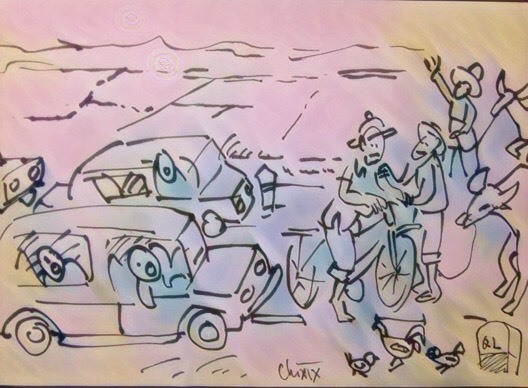 Talk Around Town
Talk Around Town

An accident between a car and a motorbike that left one person dead in the northern province of Lào Cai on March 1 has drawn public attention in recent days.
 |
| Illustration by Đàm Minh Chí |
by Mai Hiên
An accident between a car and a motorbike that left one person dead in the northern province of Lào Cai on March 1 has drawn public attention in recent days.
The collision was blamed on the teenage motorbike driver who was not old enough to legally drive, was travelling over the speed limit and was not wearing a helmet.
However, relatives of the victim and other locals gathered at the scene of incident, demanding the car driver pay them VNĐ400 million (US$17,220) as compensation. Later, the driver had to hand over VNĐ200 million ($8,600) to pay for the victim’s funeral. The collision and ensuing controversy caused congestion on highway 4D for six hours.
The incident has sparked debate among netizens, with most of them opposing the actions of the victim’s relatives and local residents.
In the past, most Vietnamese people believed the owner of the more expensive vehicle involved in a collision should compensate the owner of the less expensive one, regardless of who was at fault.
For many Vietnamese people, it seems that motorbike drivers must be poorer than car owners. As a result, whenever an accident occurred between a car and motorbike, the car owner was expected to pay compensation.
However, that mindset does not match up with the legal code.
According to article 584 of the 2015 Civil Code, a driver whose vehicle causes damage is not liable to compensate the other party if he or she did not violate any traffic laws or if the other party was at fault.
Many accidents occur because people are not aware of road laws or choose not to follow them.
Compensation following an accident is often resolved by the concerned parties without involving the police. In some cases, car owners agree to pay in order to settle the incident quickly, even when they have observed traffic laws.
A similar accident on July 10, 2017 in the Central Highlands province of Đắk Lắk that left two people dead shows that this is not the first time people have wrongfully demanded payment following an accident.
Police decided not to prosecute the case because it was caused by the two teenagers who were killed in the accident and the driver had paid VNĐ30 million for their funeral. However, the family of the two victims still filed a lawsuit demanding the car owner pay an additional VNĐ461 million ($19,850) in compensation.
Because the owner of the car did not violate any traffic laws and the teenagers were travelling too fast and were not old enough to drive, the car owner should not be required to pay. In fact, he has the right to sue for compensation for damage to his car.
Trần Ngọc Sơn, chief of the Secretariat of the Traffic Safety Committee of Lào Cai Province, said the committee has requested local police investigate the incident and settle it in accordance with regulations.
The National Traffic Safety Committee also said it was unlawful to gather at an accident site and demand compensation. This behaviour causes disorder and creates a bad precedent.
According to Trần Tuấn Anh, director of Minh Bạch Law Firm, the fact that local residents hindered forces that arrived to investigate the incident had led to traffic congestion. This action could be considered disrupting the public order in accordance with Article 318 of the Criminal Code, Anh told Gia đình và xã hội (Family and Society) newspaper.
He also said there were signs of illegal “property appropriation” by forcing the driver to pay compensation without any decision from an authorised agency.
“It is necessary to prosecute these cases to determine if the drivers volunteered to pay compensation or if their property was illegally appropriated,” he said.
As for me, I think that it’s time to stop thinking that the owner of the more expensive vehicle always has to pay.
If a pedestrian causes a traffic accident, leading to property damage or resulting in a person’s death, he or she may be subjected to criminal charges.
We are living in a society governed by laws, so everyone is equal on the road. We all have to obey the law.
The incident showed that law enforcement agencies need to take a firm stance against unlawful settlements. Only when the law is strictly obeyed will people observe traffic safety regulations, reducing traffic accidents. Agencies need a dissemination campaign to raise awareness of traffic rules. — VNS